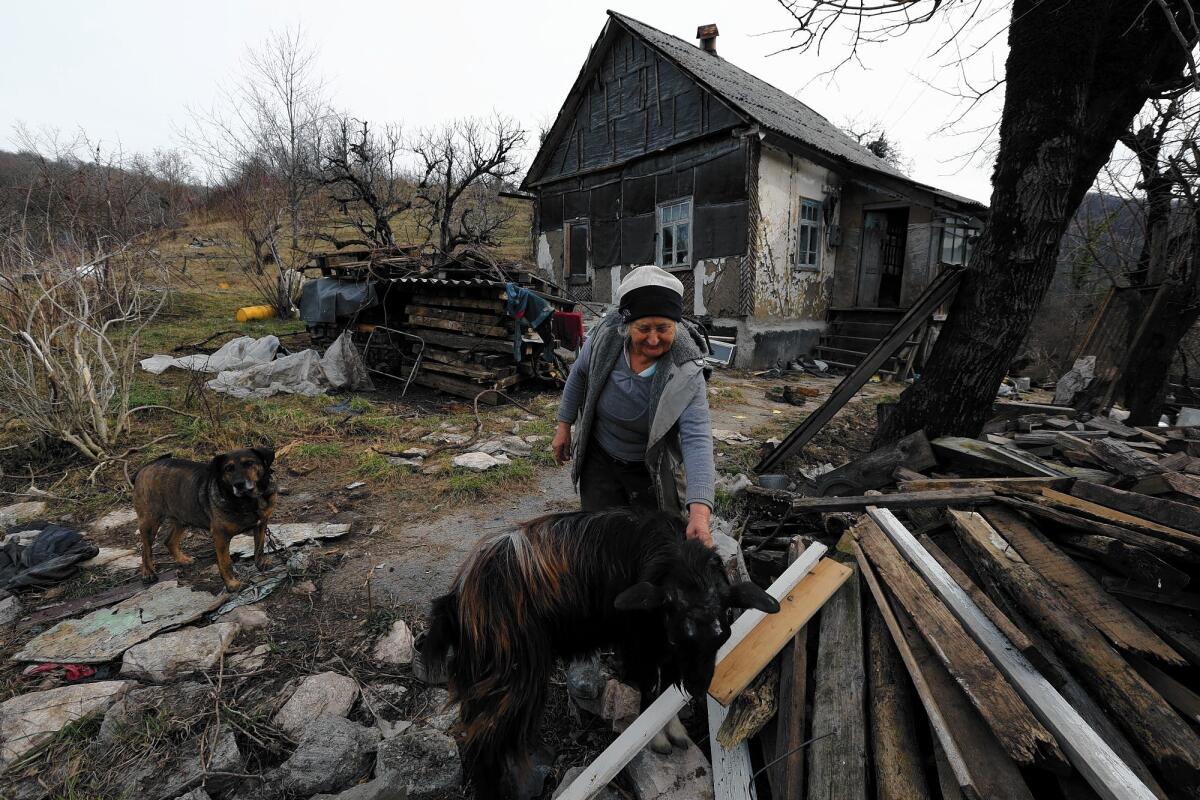Village near Sochi despoiled by Winter Olympics

- Share via
SOCHI, Russia — The road to the Olympic Games has been rocky for the 360 or so residents of tiny Akhshtyr, an ancient village not far from Sochi.
It also has been long, rutted and piled with construction debris.
Once a paradise surrounded by woods, ravines and trout streams, Akhshtyr has acquired a gigantic limestone pit and daily truck trips that have covered the village with layers of limestone dust — all part of the massive construction project that has transformed much of the Sochi area, for better and for worse. But what has people most upset are the police and security agents who have prevented them from making their usual 10-minute trip to a bus stop.
A few weeks ago, authorities erected a checkpoint prohibiting residents, either on foot or in vehicles, from getting to the road that lies a few hundred yards away. It is the main road linking the Olympic mountain cluster at Krasnaya Polyana with the Olympic village in Sochi.
That left one way out: a seven-mile winding road heaped in spots with construction waste and piles of gravel.
“They told us this measure is necessary to prevent possible sabotage along the main Olympic route,” said Ilya Zamesin, a 35-year-old farmer and local activist. “A majority of the local population are elderly people and they aren’t capable of walking seven miles to get staples — food, medicine and water.”
Many of the pre-Olympics headaches have eased in Sochi as frantic last-minute preparations were completed and some of the bugs that marred the run-up to the Games were fixed. The Olympic venues have mostly been getting high marks from athletes and spectators. Despite fears of terrorism, Russia’s vaunted security apparatus so far seems to have things under control.
Still, the Olympics haven’t warmed the hearts of everyone in this temperate corner of Russia.
In Sochi, where quiet streets are being patrolled by police and Cossacks in black woolen hats, locals complained that the promised hordes of tourists were relatively meager.
“We were told we will be dealing with thousands of foreigners; we even studied English for two weeks,” complained Nodar Bagrandzh, a 50-year-old taxi driver. “Where are all these crowds? We sit for hours without work. Our local residents are hiding out somewhere, and the promised foreign visitors and fans never came.”
Moreover, residents said, many of the places where they usually shop have closed for the Games because of security-imposed limits on what suppliers could bring into the area. Popular farmers markets have been among the casualties.
Stepan Shvets, a 65-year-old watchman, used to work at the now-empty Areda farmers market in a Sochi suburb and still lives in a cabin at the deserted market site.
“Thousands of Sochi residents would buy fresh local vegetables and meats at our market every Thursday through Sunday,” he said, “and now they have to buy much more expensive imported foods at supermarkets. No one told me if the market will reopen, but I am staying here with my guard dogs just in case.”
Locals do, of course, have once-in-a-lifetime opportunity to watch the Olympic Games up close. But there’s grumbling about that too.
“Given all security precautions and travel time — time in lines to get into mountain cluster gondolas, for instance — local residents need about three to four hours to get to a sports venue and as much to get back to town,” said Oleg Rubezhansky, editor in chief of the local Mestnaya newspaper and television network. Anyway, he said, many Sochi residents have left for the duration of the Games, especially those who don’t have proper papers to be there.
Russian culture is perhaps not best known for bubbly cheerfulness, and some of the grousing might be chalked up to a national reluctance to see the glass half full. But in Akhshtyr, people can’t fill their glasses at all: Heavy trucks carrying limestone to Olympic construction sites destroyed the village’s only two springs, which sat close to the road. Villagers had relied on them for centuries for their water supplies.
“I can’t risk taking my goats down the [nearby] gorge to the stream, and I no longer have any water for them to drink in my yard basin,” said Lubov Mulyar, 76, who lives in a hut with her dog and a dozen goats. “The police no longer let me go to the bus stop out of concern that I may blow up their new railway. So I am stuck here, and my water and medicines have run out already.”
The authorities said they are aware of the villagers’ predicament and promised to act quickly to resolve their grievances — although maybe not quickly enough for Mulyar and her goats.
“We already decided that in April we will hold a meeting to discuss their water supply situation,” said Tatiana Katanidi, a Sochi public relations official. “We also assigned a couple of buses to make four trips to and from Akhshtyr. However, we ran into a problem with these new drivers finding it hard to locate the village. But we are doing our best to help the residents.”
The phantom bus has already been dubbed the Flying Dutchman by some villagers, a reference to the legendary ghost ship, immortalized in literature and opera, that is cursed to roam the seas forever, never finding a port.
More to Read
Sign up for Essential California
The most important California stories and recommendations in your inbox every morning.
You may occasionally receive promotional content from the Los Angeles Times.













